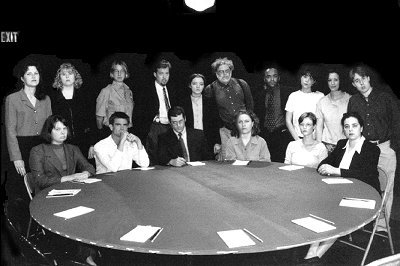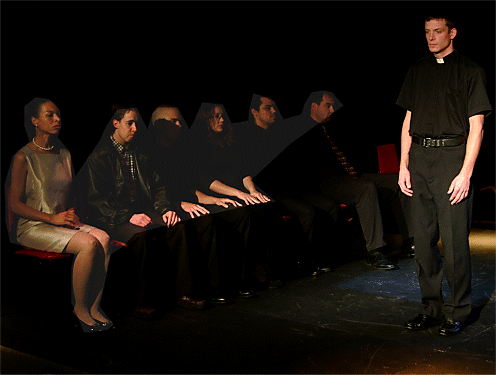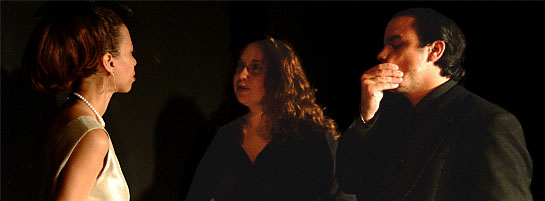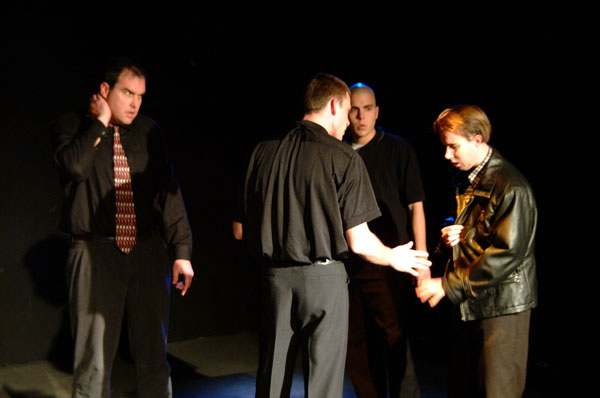An Interview with Stuart Stone of Stuart Stone Casting
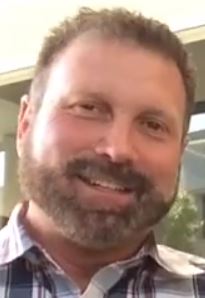
by
Harry Governick
Artistic Director, TheatrGROUP, Inc.
[NOTES from Harry Governick: The professional relationship between an actor and a Casting Director can be, especially for the actor starting out, an emotional experience ranging from joyful excitement to neurotic anxiety. The actor might be thinking inappropriate thoughts, such as “What can I do to make sure the Casting Director likes me?”, meaning “likes me as a person”, or “how can I get on his or her good side?”.
Well, I think most Casting Directors would agree that the best way to “get on their good side” is to behave like a professional actor. And to get them to “like you as a person”, behave like a professional actor. There’s really no need to do anything else. “Be yourself when you’re in a good mood.”
I am pleased to bring to the pages of TheatrGROUP this interview with Stuart Stone. I’ve had a working relationship with Stuart that is outside of the industry. We haven’t had to relate to each other as Casting Director / Actor. It’s under these circumstances that I’ve been fortunate to get to know a little bit about Stuart Stone the human being. He’s a warm guy, funny, open, bright, animated and passionate about his work and about helping actors. I recommend his book, ACTING OUT, for anyone interested in learning what it takes to work in Television Commercials. It’s my hope that this interview not only educates the interested actor, but also emphasizes the “human” in the being named Stuart Stone.]
Bio
While a picture may be worth a thousand words, to casting director Stuart Stone, it’s the face that makes the impression. His eye for leading and emerging talent has kept him at the forefront of film, television and commercial casting in Los Angeles for nearly a decade.
With the reputation for having an innovative and imaginative approach to the casting process, Stone’s eye for talent gives him the edge needed to fill today’s dramatic and dialogue-driven commercial spots as well as spots targeted towards the beauty, comedic, niche, children and sports markets.
Got Clio? Stone does. As well as numerous other industry accolades for his work. Not only has his tireless discovery of intriguing new actors and models earned him recognition from many directors such as Sam Ramie ( TV’s “Zena: the warrior Princess” and “Hercules: The Legendary Journey’s”), Kinka Usher, Jim Sonzero and James Cameron (Titanic), his utilization of known actors such as Matthew Perry, Hillary Swank, Leonardo Di Caprio, Haley Joel Osmet, Molly Shannon, Casper Van Dien, Sean Hayes and Scott Wolf demonstrates his ability to successfully cast a vast array of first class projects.
Stone’s knowledge of new faces entering the market guarantees the client the freshest “look” will be discovered for their project.
In addition to his knowledge of Los Angeles, New York and Chicago talent, Stone has cast projects throughout the world, searching for real people indigenous to the location being depicted. That kind of versatility and flexibility provides the client with the best possible cast for any given project. Even if it means that Stone will have to sift through a thousand pictures or people to find that one lo
The Interview – July 14, 2003
H: = Harry Governick
S: = Stuart Stone
H: How old are you?
S: Ohhhhh. Old.
H: Okay. Are you a California native?
S: Yes.
H: Okay.
S: You can’t tell anyone how old I am.
H: (laughing) That’s why I asked.
S: It’s an ancient Chinese secret.
H: What about actors? Do they need to tell their age?
S: No.
H: Just give… like… an age range?
S: Yeah, give an age range. Because when they come in, it’s ‘what do we believe they are? Can they portray the age we want?’
H: Okay. What really attracted you to casting?
S: I kinda fell into it. And then found that I really loved it. And it was exciting to be able to call people and book ’em, and you know… it’s kinda like that’s their dream. People dream of being on TV. And being able to do that for people. It was just such an excitement.
H: So you weren’t actually attracted to it, you just fell into it?
S: Yeah. I just fell into it.
H: Care to share any of those details?
S: Well, I came back from college and I was supposed to go work in an advertising agency that I worked at when I was in college. They hired me out of college. And I decided, ‘Well, they gave me the summer off’, and I decided I would kind of just hang out. And then a friend of mine said a lady she knows needs help. So I started helping her, and then another casting director… you know a lot of casting directors work within the same office. So another casting director met me, and needed some help, so I worked with her because the other one wasn’t working that week. And I kept meeting casting directors, and I guess my name got around, and I just ended up working every day. Before I knew it, I was prepping… a good job, I was selecting the talent, I was choosing who comes in, putting them on tape, auditioning them, directing the session, running the camera. And so I was doing the whole thing, and I thought, you know, wait, if I’m doing the whole thing maybe I should just be on my own. So after years of learning, and understanding the laws, and how SAG [Screen Actors Guild] works, and what’s expected, and just really putting in my dues, I decided to go out on my own.
H: Okay. So how long have you actually been Stone Casting?
S: Stuart Stone Casting has been around for five years.
H: Okay. And you’re a little bit unique there, right?
S: Well… in what sense?
H: For one thing, don’t you… this is just my understanding, I might be wrong… you kind of pride yourself in or specialize in “real people”, right?
S: Uhm. You know, I don’t have a specialization anymore. I used to try in categories… you know… some casting directors went out and did location casting of “real people”. And I was originally known because I would do location casting. So I would go all over the United States. I worked in the Caribbean, I worked in various countries casting people that were indigenous to that area. Depending on the commercial.
But right now there’s … I mean I used to also be known for doing “beauty people” because I cast a lot of beer spots, and “beauty girl” spots. You know, the model guys, and those kinds of things. And then I kind of got in to doing dialog spots, and comedy.
As I got different directors, and they had different talents, and shot different types of commercials… so I was casting different things.
H: Okay. So you’re pretty much open to everything right now.
S: Right now I’m pretty diverse. I do everything.
H: What is talent?
S: What is talent?
H: Yeah.
S: Talent is a trained actor.
H: Okay. How do you find talent?
S: I find talent from agent recommendations, meeting people, going out into… you know I travel a lot. Either I’ll do a workshop or a seminar, or I’ll talk at different events that I get invited to, different places that I go to. And those places I get to meet a lot of talent. So I meet a lot of talent that isn’t local talent.
What’s unique about what I do, if you go back to what’s unique about me… my uniqueness is that I find new faces. Directors and producers come to me because I find new faces. Talent that I find that’s trained, that’s maybe not from California but they’ll come out to California for an audition, and you know, your director or producer goes, “Where’d you find them?”, and it’s like, “Secrets”, you know?, “the point is they’re here and you love ’em.
I go out and look for people. I’m constantly keeping an open eye, I’m constantly looking wherever I go. It seems like I’m working all the time.
H: Okay. You know, something you said, and I’ll keep this out of the interview if you want to, because it can be tricky. But for my students here at TheatrGROUP, one of the recommendations I give them when they leave here and go out to L.A., is to jump into a commercial workshop taught by a commercial casting director. I tell them that there’s two advantages there. For one thing, they’re gonna learn the business right from the source, and that’s the best thing they can do. Secondly, I’ve found that many commercial casting directors actually keep their students pictures in their files, and if the opportunity comes up in the future they may actually bring them in for an audition. Am I giving them good advice?
S: Yes. That’s exactly true.
H: Okay. Should I leave that in the interview?
S: Uh huh. That’s really good. I mean I would say that I just don’t like to pitch my workshop. The only thing I would change is to make sure that it’s a casting director that’s currently working within the industry.
H: Right. Good.
S: You’ve got those casting directors that teach, and it’s like, “but that was old stuff.” You get some of these older casting directors that will teach, but they’re doing it more for the money because they’re not working as casting directors as much. Which is kind of a drag, you know?
H: Yeah.
S: I don’t want them not to get the money and not to teach, but, you know, it’s not current.
H: Right. It’s better for the actor to stay with someone who’s current.
S: Right.
H: Do actors without agents ever get in the door?
S: Yeah. Because I’ll often look for a new face. If they’ve got training I’ll definitely bring them in. Because it’s so hard… an agent is subject to whether an agent wants somebody or not, and I’ve seen agents pass on great people. So if there’s an actor looking to get represented, and they’re new to town, and they’re just not getting a “yes” yet, but they’re talented… so for them, they’re frustrated, and if they come by the door… but it’s hard. Because we don’t have the same amount of time as we used to prep a job and cast it. Sometimes now you prep and cast in the same day. Or prep in the afternoon and cast the next day. So you don’t have a lot of time. So the people that are really getting seen are the ones that you can count on, that are with agents.
I do take that rare chance of bringing somebody in because they’re new.
H: Where would you find them? Through headshots and resumes that are sent to you?
S: No. I really recommend postcards. But it’s only valuable if they’re sending something to me and at that particular time it just so happens I’m looking for someone their type. Otherwise we don’t sit around. I would tell actors it’s really a waste to waste your money sending out 8 X 10’s.
H: Okay. So it’s rare that an actor without an agent will actually be seen.
S: It is rare. Because how are you going to find them? Unless they have a connection to you in some way, a friend, a buddy. I mean, it’s not that I shut the door to them because they don’t have an agent. But there’s no way they’re gonna be able to know what I’m casting.
H: If an actor’s in your workshop, and shows a lot of potential talent, and you’ve decided that you could probably use that actor in casting something, are you able to recommend the actor to an agent?
S: I have in the past recommended actors to agents, and they’ve been happy about that. Or the actor a lot of times comes from an agent recommendation, and they go back to the agent and the agent doesn’t sign them. I’ve actually put people from my workshop into commercials. I mean, they happen to be there, and they were right, and I brought ’em into the audition, and they ended up booking. So it does happen. But I can’t ever guarantee that because they take my workshop they’re gonna get an agent or a commercial.
H: Right. Well, for one thing that’s illegal for you to do that, even if you could.
S: Right. That’s why I wanna be clear when we talk about what I do in my commercial workshop. The people aren’t coming to me because I’m gonna call an agent for ’em.
H: Would you define commercial acting technique as something different than stage, film or television?
S: I kind of use some television acting techniques in my commercials, because they’re like “mini-movies”. Sometimes it’s a “mini-monolog”. It’s like a 30 second or 60 second, quick little film. But stage actors tell me there is a difference here. It’s picking up the speed, the tempo, you know… getting the message across in a quick format. So there’s definitely a technique to doing it.
H: What about “cold readings” at auditions? How important is it for the actor to be trained in “cold reading” technique?
S: Not really. And I highly recommend that you never memorize your copy [script]. A cue card is always provided. It’s a SAG rule. So I highly recommend you don’t memorize. Because what happens is that they try to memorize in such a short amount of time that they forget to act, and they just start saying the words. And then they can’t find their words on the cue cards if they make a mistake, and they’re not able to act. It just gets to a big frustration, and usually those people don’t stay on the tape. Or they’re so frustrated, they walk out. They say, “I blew it. I just can’t do it.”
H: Which really is a “no no”, right? They should stay and do it anyway.
S: Well, if they can’t get it and they keep messing up the dialog, and they’re not doing the lines right, and they can’t remember it, and they’re not acting, it doesn’t do ’em a service to put them on there, and looked at. And I don’t want to be looked at as a casting director sending some incompetent talent there. And a lot of times it’s not that the talent is incompetent, it’s just that they chose to memorize this time. But they’re coming across looking incompetent. So I end up looking bad. So I do have to end up taking them off the tape.
H: What can an actor do to really get on your bad side?
S: Uhm. Getting on my bad side. Getting booked, they accept my job, and then they turn around and cancel it. Because, and I understand this… but… they don’t handle taking the other job properly, and they don’t try to work it out, and they stick their manager in the way. So that I’ve already booked ’em, and they don’t honor my booking. I’ve done my job. It leaves the casting director in a hole. It always comes down to the casting director, not the agent or the actor.
H: So they might book another commercial, or a T.V. gig or something?
S: Yeah. They’ll get a T.V. or a film, and they’ll take that over the commercial. Even when the commercial will pay them a lot more money. Another thing is actors who come rushing into an audition late and wanna be seen right away. And anyone who’s rude and disrespectful.
H: How important is the Internet for commercial casting?
S: Everything that I’m doing right now is on lacasting.com. That’s the only way I do casting. I don’t do 8 x 10 pictures in the office anymore. Just using the Internet, and the only service I’m using is lacasting.com.
H: And do agents use that service?
S: Yes. It’s a service that goes between agents and casting directors. And that’s how they’re submitting now. Every commercial agent is on there now, and every casting director.
H: Okay. So, for actors wanting to sign up with some of these… and there are literally dozens, if not hundreds of these internet websites that will charge an actor to post a picture and resume… would you recommend that as something not to do?
S: Don’t sign up with any service other than the one your agent is using. Ask you agent what service they’re using. But I know that 98% of casting directors are solely using lacasting.com.
H: Okay.
S: There are other services, but the number of casting directors and agents that are using those services are smaller. And it’s always gonna be that, you know, when the casting director decides they’re casting with L.A. Casting, then the agent will use it. If someone says they’re on another service, because there’s two or three other casting directors who are using that other service, the agent will have to be on that service. But the main one that’s here, that everyone’s using, that we’ve decided as a group, as agents and casting directors, is lacasting.com.
H: You also cast industrial videos?
S: I’ve done industrials. We’ve cast a lot of stuff. We’ve done Industrials, we’ve done independent films, we’ve done pilots, we’ve done hosts, we’ve done voice-overs.
H: What advice would you give to an actor who’s just starting out?
S: Get my book. Get Judy’s book [Judy Kerr’s “Acting Is Everything”].
H: (laughing)
S: The best thing is to make sure they get trained. The most important thing is to find legitimate training.
H: Specifically for commercials.
S: For commercials. So they’re prepared.
H: Alright. Can you think of any questions I might have overlooked, or anything else you’d like to say?
S: No. This was good though.

